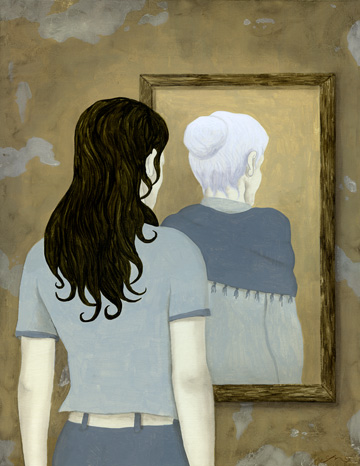The Las Cruces neighborhood where I spent the first 12 years of my life was quiet and sparsely populated. Beyond the residential streets spread an expanse of desert dotted with mesquite and dry washes that became raging arroyos when it rained, and that desert, with its living treasures of blue-tailed lizards, horned toads, snakes, beetles, and spiders was my playground. Our elementary school had one of each grade, first through sixth, and a few special education classes. It was the late 1960s and one of the most indelible icons of those years was a sign. A symbol, really, a red hand with fingers up and palm out, stenciled against a yellow background. Or perhaps the background was white. I don’t remember. The symbol designated a safe place, a helping hand. If you were a little kid coming home from school or from a friend’s house and you suddenly felt unsafe, you were supposed to run to one of these homes for help.
To my knowledge, no one I knew ever had occasion to use this symbol, but stories about child snatchings abounded. Maybe well-meaning adults in our lives scared us to keep us safe. Because scared we were: of unknown men cruising our streets, of the people who lived in a trailer park down the road, of anything that was out of the ordinary for us. One neighbor even stopped me on the way home from school once to tell me a carload of hippies had grabbed a boy walking along the street, so I’d better be careful.
While we were looking among strangers for the cucuy, as we Mexicans call the boogeyman, he appeared much closer to home. It was one of my father’s brothers, an uncle, who sexually abused me when I was just a few years old. No charges were filed, ever, though he did leave me with a legacy of anger and some serious therapy expenses later in my life. I return to this not to rehash the past, but to study my mother, the forces that shaped her—especially after the abuse—and that shaped our relationship. I look back, too, as a way to find myself again in her, to see who I have been to her, and who I might become on this leg of our journey together.
After the abuse, my mother became more watchful, more of a grizzly bear on alert to the safety of her nearby cubs, though it would be decades before I made this connection. When I look back at those days, the scenes of my childhood are colored by this yellow-green haze of my mother’s perpetual vigilance. She was tough.
One day, while my siblings and I played in our front yard, a man cruised slowly by in a station wagon, eyeballing us. We were small, all of us probably younger than 10. The man must have driven by several times, because my mother came outside and called out to him, point-blank asked him what he wanted. The images and sounds of the moment are disjointed: his ruddy face and squinty eyes cutting across at my mother; the shake of his head as he paused, window down to hear my mother; my mother’s voice edged with something metallic and sharp; and the car slowly rolling away, up the street. Thinking back, I recognize the steel in my mother’s tone as the fierce determination of a woman who recalls the past and issues edict: you will not touch my children.
We didn’t see him again, though my mother was by then a career sentinel over her children. She often trained her watchfulness on me, in particular. Maybe it’s because I’m her firstborn, and by the time my siblings arrived, she was more relaxed. Or maybe it’s because she would forever be searching my face for a reflection of that assault known only to us and one of her sisters, my favorite aunt. We had, in fact, buried that part of our story so deep that it would be years before we’d be able to dredge it up together tearfully, regretfully, to examine its consequences on our lives. Then we would rebury it, because it was just too painful to have out in the open.
And then one day I woke up and it was 2007, and the fogs of dementia were rolling across my mother’s brain. She and one of my aunts—the one who shared our secret—were in North Texas with me when we learned that the uncle who’d abused me had died. And my mother, still friends with my father despite their divorce, lamented being away from home and unable to give a proper condolence to my dad—went so far as saying that she regretted not being able to attend my uncle’s funeral. And when my astounded aunt asked her what business she might have at the funeral of her daughter’s abuser, my mother burst into tears. She had completely forgotten.
Sometimes, now, I look in my mother’s face and search for the reflection of that long ago trauma, and when I don’t see it, I long to ask for her validation of my pain once more: “Mom, do you remember that day? Do you remember?” But I don’t. Because she would just smile abashedly and say, “I don’t remember.”
And maybe that’s a good thing.
===As an attendant wheels my mom away in the bustle and noise of Love Field, I realize that by the time the plane touches down, she will have forgotten much of her time with me. In fact, she probably already has.!==
My studio shoot goes poorly. Or maybe it just feels that way because I’m having an off day; I’m tired and can’t think clearly. What’s worse is that for some reason, my mother woke up more fearful and paranoid than usual. Terrified that I’m going to abandon her, she won’t stay put, wanders around the building looking for me, which only flusters me more. “Where is she?” I hear her ask John as I perch atop a ladder fumbling with apertures, shutter speeds, and a cable release. “Where is she?”
I don’t cry easily, but some days just beg for indulging in a great big pity party complete with a baseball bat and sad piñata. Today is one of them. I want to wail. I want to kick and scream, “It’s not fair! Why me? Why my mother?” None of this helps my feelings of frustration, my ineptitude in the studio today, my fears of blowing this job and making a fool of myself.
Finally, I tell myself to stop. To remember that in my career I’ve managed some pretty complicated stories under adverse conditions. That I’ve hung with gang members who showed off their guns and taunted me with threats of rape. That I’ve covered stories in other countries and that I once had all my photo equipment stolen in Mexico and, damn it, I hunted that thief down and I got it back. I have a Pulitzer for Christ’s sake! I can make it through this day.
And I do.
On the way home, the title of M.A. Harper’s novel about a woman caring for her demented mother loops through my mind, “The worst day of my life, so far. The worst day of my life, so far. The worst day of my life, so far.” It describes the day perfectly.
By the time we get home, our old dog Zeke is nearing the end. John and I vacillate. Of all our dogs, Zeke has always been the most wary of veterinarians and needles. So when he is finally resting peacefully but is otherwise responsive, we decide to wait out the night. The next morning, he has a seizure. We load him in the car and head to the vet, but he dies before we can get there. Mom is still asleep when we get home.
We have a client who is scheduled to tape a stand-up shortly in the same studio where I worked yesterday, and because I wrote the stand-up, I’m the one who needs to head to work. I wipe my face and remember to smile when I wake my mother to say that John will feed her breakfast and I’ll be back shortly.
It turns out I was right about yesterday. But today is now the worst day of my life, so far.
The Saturday before Thanksgiving, one of my cousins calls to say that my mother’s youngest brother has died. Mom is sitting on the couch with her prayer books when I take her hand and break the news.
“Mom, I have to tell you something,” I say. “Your brother died this morning.”
Sadness creases her forehead momentarily. “Cómo me puede,” she says. But her grief is fleeting. How can you weep for someone you don’t remember? She seems mostly puzzled, and says, “But I was praying for him,” as if wondering how he could have died when she was interceding on his behalf.
“Well, now you have to pray for the repose of his soul,” I say gently, and add another role to the ones I’ve assumed in my mother’s decline: mourner.
Two days later, more than 600 miles away, our family buries one of its own. In North Texas, my mother concentrates on her coloring book. And I remember my uncle, the one who, in his infancy, was the family favorite, coddled and sung to sleep by his sisters, including the one who sits at my kitchen table clutching a crayon bouquet.
Mom returns home on a cold evening in early December. My brother is flying home with her, and already there are major changes. For the first time in her life, my mother makes her way to the Love Field gate in a wheelchair. She fell on the first leg of this trip, at the El Paso airport, and we all decided a wheelchair is safer. And although it goes unspoken among us, we know this is likely Mom’s last trip. Travel is more difficult, more disruptive for her. From now on, when my sister needs a break from caregiving, we will travel to El Paso.
As an attendant wheels her away in the bustle and noise of Love Field, my brother walking close by, I realize that by the time the plane touches down, Mom will have forgotten much of her time with me. In fact, she probably already has.
It’s up to us, her family, to reflect the parts of her life that made her who she was so that she doesn’t completely disappear. I promise myself that from now on, I will be to her what she has been to me most of my life, a reflection of where she has been, what she has done, and what she has hoped for.
I will remember.
Beatriz Terrazas was part of a team in 1994 at the Dallas Morning News that won the Pulitzer Prize for a project on violence against women.






